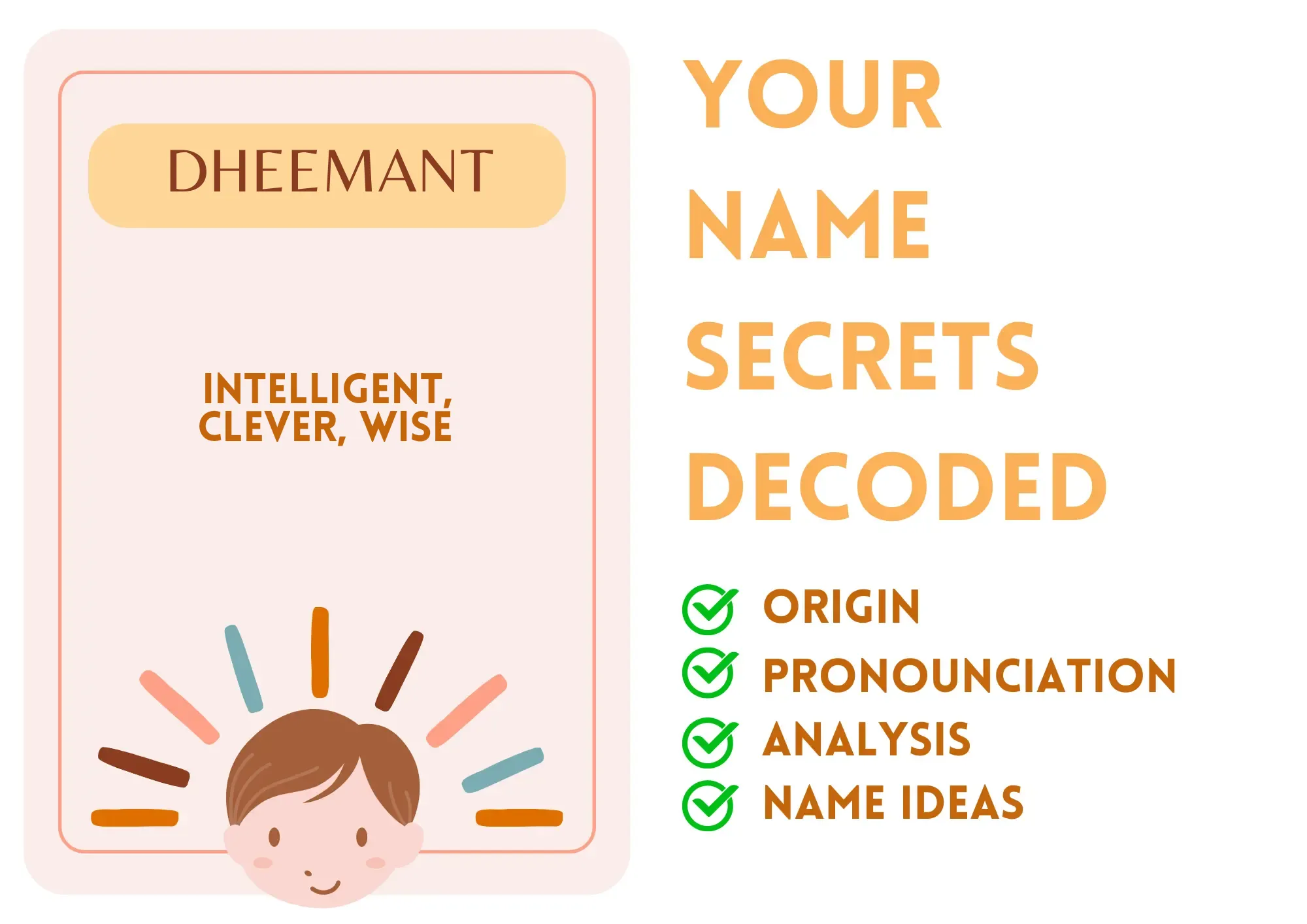
Dheemant
Dheemant is a unique name of Sanskrit origin, meaning 'intelligent' or 'clever'. It is predominantly used in Indian culture and connotes wisdom and intellect. The name is typically given to boys but can also be used for girls in some contexts, making it slightly unisex.
Dheemant is instilled with cultural significance, often linked to the qualities of astuteness, thoughtfulness, and brilliance. It reflects a desire for the child to possess these commendable traits as they grow.
Generally perceived positively, Dheemant represents creativity and intelligence, making it an attractive choice for parents wishing to instill these virtues in their child. It is fairly easy to write and pronounce, contributing to its appeal.
Basic Information
Gender: Boy
Sounds Like: DHEEM-ahnt
Pronunciation Explanation: The emphasis is on the first syllable 'DHEEM', pronounced like 'dream' without the 'r', followed by 'ahnt', similar to 'aunt'.
Summary and Meaning
Meaning: intelligent, clever, wise
Origin: Dheemant originates from the Sanskrit language, a classical language of India that is the sacred language of Hinduism.
Usage: While Dheemant is traditionally recognized as a masculine name, its meaning and phonetics may allow for unisex usage.
Name Number (Chaldean)
Name Number (Pythagorean)
Name Constellation (Nakshatra)
Name Zodiac Sign (Rashi)
Popularity (Global Rank)
Overall: 262137
Boys: 72681
Most Popular in
Religious and Cultural Significance
Religion: Hindu
Background: In Hindu culture, Dheemant represents a laudable trait that is highly valued. Names associated with intelligence and wisdom are often inspired by revered texts and figures.
Cultural Significance: The name is chosen for its positive connotations and aspirations for children to embody wisdom, often associated with learning and success.
Historical Significance: Dheemant captures the essence of knowledge and intellect, traits that have historically been revered in Indian literature and philosophy. The significance of being wise and clever is evident in many stories and teachings from ancient Sanskrit texts.
Popular Culture
Literature and Mythology: While not widely recognized in major epic literature, names with similar roots often appear in Indian texts that emphasize intelligence and wisdom.
Movies and Television: There are no prominent characters named Dheemant in mainstream Indian films; however, names invoking intelligence often appear in stories that celebrate clever protagonists.
Feelings and Perceptions
Perception: Dheemant is seen as a sophisticated and auspicious name, suggesting an intelligent and wise individual. It embodies positive connotations and a deep cultural resonance.
Positive Feelings: Unique, wise, intellectual, hopeful, aspirational.
Negative Feelings: May be considered unconventional or difficult for some to pronounce initially.
Practical Considerations
Ease of Writing and Calling: Dheemant is relatively easy to write and pronounce, consisting of seven letters and two syllables, making it memorable.
Common Typos and Misspellings: Dhimant,Dheement,Dheemanth,Dheemont
Common Nicknames: Dhee,Dhi,Ment
Dheemant Popularity
Dheemant Usage and Popularity By Country
| Country | Rank (Overall) |
|---|---|
| Fiji | 6362 |
| India | 57502 |
| Canada | 149654 |
| United States | 344452 |
Dheemant Usage and Popularity By City
| City | Rank (Overall) |
|---|---|
| Bombay | 18432 |
| Bengaluru | 26501 |
| Delhi | 21734 |
Compatibility Analysis
Famous Persons Named Dheemant
No results found for Dheemant.
Related Names
Similar Sounding Names:
Dhiman,Dyan,Deven